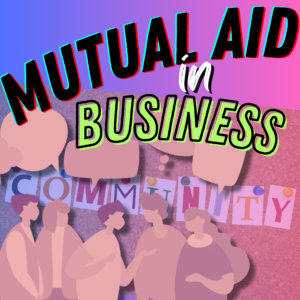Mutual aid and community support play crucial roles in empowering entrepreneurs to build anticapitalist businesses that challenge traditional profit-driven models. By embracing these principles, entrepreneurs can foster a more equitable and socially responsible business environment that prioritizes collective well-being over only focusing on individualistic gains. Here’s how mutual aid and community can benefit entrepreneurs in building anticapitalist businesses:
Shared Resources and Skills: Mutual aid involves the sharing of resources, skills, and knowledge within a community. Entrepreneurs can tap into this network to access expertise, tools, and guidance without the need for costly external services. This collaborative approach reduces financial barriers and encourages the growth of businesses without relying on traditional capitalist structures.
Collective Problem-Solving: In a community built on mutual aid, entrepreneurs can collectively address challenges and find innovative solutions. The diverse perspectives and experiences within the community contribute to a more holistic problem-solving process, often leading to creative and sustainable solutions that benefit everyone involved.
Equitable Support: Mutual aid focuses on ensuring that everyone’s needs are met. Entrepreneurs can find support without the pressure of competing for limited resources. This level playing field enables individuals with marginalized backgrounds or fewer financial resources to receive the assistance they need to thrive, fostering inclusivity and diversity in the business landscape.
Alternative Funding Models: Mutual aid communities often pool resources to provide financial support to those in need. Entrepreneurs can explore these alternative funding models to sustain their businesses. This approach reduces reliance on traditional investment structures and allows entrepreneurs to maintain greater control over their business direction.
Ethical Networking: Building an anticapitalist business involves collaborating with like-minded individuals who share a commitment to social and environmental responsibility. Mutual aid communities provide a space for ethical networking, connecting entrepreneurs with potential partners, customers, and suppliers who align with their values.
Community Marketing: Mutual aid communities create a supportive environment where members genuinely care about each other’s success. Entrepreneurs can leverage this goodwill for marketing and promotion, relying on word-of-mouth recommendations and community-driven endorsements to reach a wider audience. Entrepreneurs can tap into the existing connections within mutual aid and collaborative communities to expand their social media reach. Collaborative platforms provide a space to share content, co-create campaigns, and cross-promote each other’s initiatives, effectively leveraging the collective networks of community members.
Resilience and Adaptability: Mutual aid fosters resilience by building a community that is collectively invested in each other’s well-being. This resilience extends to entrepreneurs navigating challenges, as the community rallies to provide emotional support, encouragement, and practical assistance during difficult times.
Shifting Business Culture: Engaging in mutual aid and being part of a community that values collaboration over competition can reshape an entrepreneur’s mindset. It encourages a shift away from profit-centric thinking toward a focus on social impact, ethical practices, and sustainable growth.
Incorporating mutual aid and community support into the foundation of an anticapitalist business not only strengthens the business itself but also contributes to the broader movement for a more just and equitable economic landscape. Entrepreneurs who prioritize these principles not only benefit from shared resources and expertise but also become catalysts for positive change within the business world.
Inclusivity through Mutual Aid
As an online community center, One Free Community creates free non-transactional knowledge exchanges to support our members. We do this by creating spaces in asynchronous chats, live conversations, or co-working sessions to teach and support each other. We harness the power of crowdsourcing within the community to facilitate connections, share knowledge and resources, and discuss business planning and social media marketing strategies. This mutual aid approach fosters a supportive ecosystem that values diversity and equity. By embracing this culture, One Free Community empowers our neurodiverse and marginalized entrepreneurs, overcoming barriers that have hindered their entrepreneurial journey in traditional settings.
One Free Community excels in community building and empowerment. Through group events and knowledge sharing, entrepreneurs within the center collectively navigate challenges and celebrate successes, fostering a strong sense of belonging and support. By embracing inclusivity, redefining success, and promoting social impact, One Free Community paves the way for a more equitable and sustainable entrepreneurial landscape. Through the collective efforts of the community, One Free Community enables entrepreneurs to collaborate, innovate, and create positive change, shaping a future where diversity and equity flourish in the virtual entrepreneurial world.
Learn more about One Free Community
About the Author
Jesenia, a collaborator with Calling Up Justice and cofounder of One Free Community, is working to build a more equitable and inclusive world by building communities. Learn more about her on NeuroSpicy Networking Website or Read Jesenia’s Bio.

